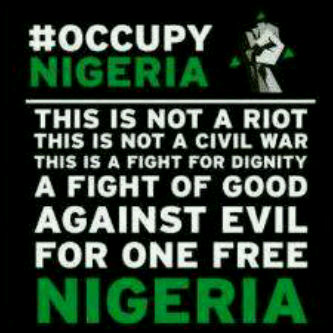As the New Year started, my home country of Nigeria received a crippling blow from its government: a fuel subsidy removal that instantly doubled the cost of living. The most common reactions were those of disbelief and horror, because how could the President possibly expect the people to cope without corresponding salary spikes? How were they supposed to feed and transport themselves if their income could only cover half of their needs and responsibilities?
The #OccupyNigeria movement is our response to the government. Its Wikipedia page gives some idea of the situation and its effect on the nation:
“
Nigeria is Africa‘s biggest oil producer, but still imports refined petrol. The country produces about 2 million barrels of crude oil daily which is exported to be refined abroad even though the country has 4 refineries with installed capacity of 445,000 bpd. Despite this, the country imports 250,000bpd of petroleum products into the country for sale to its citizens. The price of petrol has increased from 65 naira ($0.40; £0.26) per litre to at least 140 naira in filling stations and from 100 naira to at least 200 naira on the black market, from which many Nigerians buy their fuel. Due to years of mismanagement and systemic corruption, Nigeria does not have the capacity to refine crude oil into petrol and other fuels.With the majority of Nigerians living on less than $2 per day, cheap petrol is viewed by many Nigerians as the only tangible benefit they receive from the state, hence the widespread disapproval. In addition, the economy is heavily reliant on crude oil (amongst other reasons,due to absence of essential infrastructure and services such as constant electricity). A consequence of this is that other seemingly unrelated items are tied to the price of fuel as has occurred from previous price hikes. Due to the absence of stable electricity, gasoline generators are a common energy alternative for small businesses and residences.
With each hike, there is a commensurate rise in the cost of production of goods and services which would be transferred on to the consumers, leading to widespread inflation. Unfortunately, even when fuel price hikes were reversed in the past, the increase in the cost of goods and services (inflationary reaction) remained.
#OccupyNigeria is a widespread phenomenon that goes beyond the borders of Nigeria. It is a protest that genuinely springs from the heart of every Nigerian at home and abroad who feels the sheer injustice of the subsidy removal, and who refuses to accept it.
Our hearts are connected and our voices are raised in protest because we will not be brought to our knees by our own government.
We will not be oppressed and have our freedom of expression subjugated by a leadership that turns a blind eye to the suffering of its citizens.
We assert our right to occupy Nigeria because we are Nigeria; we are the people, we are the country. We assert our right to demand fair treatment that is sensitive to our needs and enables an acceptable standard of living. We assert our right to a country that seeks to make our lives better and more stable, not harder and more chaotic.
Mass protests and a nationwide strike are scheduled to start today in Nigeria. I know some people are doubtful that anything will change, but I choose to believe that this situation must be turned around. I choose to believe that the people are finally taking a stand to halt oppression and insenstivity, to actively influence government policies, to resist bowing their heads and “coping” because they feel they can’t do anything. They can do something, and they’re doing it by demonstrating against an unfair action.
Links of interest:
http://saharareporters.com/news-page/occupy-nigeria-foremost-nigerian-novelist-chinua-achebe-other-writers-declare-solidarity A solidarity statement by some Nigerian writers at home and abroad.
http://en.wikipedia.org/wiki/Occupy_Nigeria The official Wikipedia page for Occupy Nigeria with an overview of the movement and its objectives.
http://www.facebook.com/pages/Occupy-Nigeria/160388144055585 The official Facebook page for Occupy Nigeria, regularly updated with information about protests tied to the movement.


I believe in Occupy Nigeria! We must rid the country of insensitive and callous politicians whose only goal is to rape the economy. Go Nigerians Go!
Brilliant piece Otiti! Nigerians have never been so united. #OccupyNigeria.
We got each other's backs #occupynigeria
@Ms. Thomson: You know it!!! The time for change is NOW. Enough suffering already.
@Kuceli: Thanks, my love! Yeah, I believe our unity is a beautiful thing and, hopefully, here to stay.
@Chioma: Word. 😀 About damn time, too.
My fervent hope and prayer is that we continue to remember WHY we are occupying Nigeria, it is not about the fuel pricing or subsidy anymore. It's about gucci beans and louis vuitton rice with polo vegetable oil. waste waste waste. oh for a poisoned apple and an unknown “lady of the night”…
aanyway.. fantastic piece.